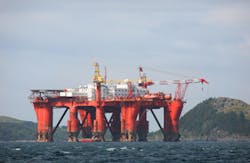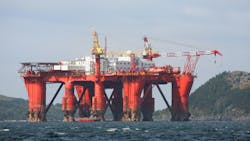The decline in the UK's oil and gas production in the North Sea is likely to prove short-term and is predicted to pick up thanks to better technology and renewed interest from investors that will spur new drilling operations, pouring vital capital into the British economy, Oil & Gas UK claimed.
New figures released by the industry body group revealed that the total output is expected to drop by a further 3 to 6 percent this year but is likely to lift off and recover nearly a third of what it lost by 2017, as some 50 new oil and gas fields are set to be launched on the UK's Continental Shelf.
According to data from the Office for National Statistics, the fall in oil and gas production came as a hurdle for economic growth in 2010 and 2011 and held back growth in GDP by 0.2 percent in 2012. The decline in production is not only impairing the domestic economy but also affected the global Brent crude benchmark over the past two years, Reuters noted. Mike Tholen, economics and commercial director at Oil & Gas UK, said that operations were put to a halt in many fields over the past couple of years because of the unreliability of the sector. There have been so many unexpected shutdowns that the situation had become intolerable, he added.
RELATED: Oil and gas investments in North Sea reach highest level in 30 years
However, the UK's oil and gas industry remains optimistic, stating that the situation will change for the better in 2014, with the start of production in 14 new oilfields off the UK coast by the end of next year. It is estimated that by 2017 Britain's North Sea oil and gas production will rise to approximately 2 million barrels of oil equivalent per day, up from 1.55 million in 2012, Oil & Gas UK said. Still, these levels are far from the 2.7 million barrels of oil equivalent per day recorded in 1999.
Industry experts explained that smaller reserves or wells that are more difficult to access have been exploited due to prices above $90 a barrel, which have persisted since the end of 2010. The use of new, more advanced technology to improve recovery rates has been essential for the industry, as the average recovery factor for the global oil industry is only around between 25 and 35 percent. According to Juan Carlos Gay, a partner at consultants Bain & Company, improving the recovery factor just one percent globally represents two or three years of global production. That is why anything that can boost the recovery factor of a field has a huge impact on output, he explained.
One of the companies that is expected to start operations in the final quarter of this year is British EnQuest. Its Alma/Galia project is too small to be of interest to any of the major oil companies but it is big enough to make operations worth it. The project is estimated to produce about 20,000 barrels of oil equivalent per day from the already abandoned Argyll – the first British producing field. Because of the difficulties involved in extracting the remaining 34 million barrels of oil, the field has been decommissioned twice so far.

